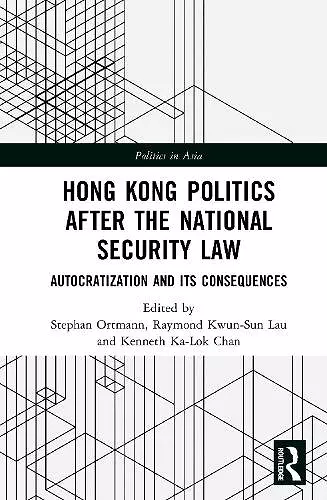Hong Kong Politics after the National Security Law
Autocratization and Its Consequences
Stephan Ortmann editor Raymond Kwun-Sun Lau editor Kenneth Ka-Lok Chan editor
Format:Hardback
Publisher:Taylor & Francis Ltd
Published:22nd Apr '25
£145.00
Supplier delay - available to order, but may take longer than usual.

Ortmann, Lau, and Chan together with the contributors provide an innovative assessment of the impact of the National Security Law on Hong Kong politics. The law was introduced by the Chinese government in 2020 and has since fundamentally transformed the political landscape of the former British colony. The book explores how Hong Kong's transformation in governance, law, education, and civil society has amounted to one of the most significant episodes of autocratization in the world in recent years.
Each chapter provides theoretical and methodological approaches to capture the different dimensions of the influence of the National Security Law on Hong Kong politics. The trends discussed in the book are of global relevance to the discussion of the current trends of increasing autocratization and this provides insights into the institutional transformations and the adaptive response from Hong Kongers. Also, the extra-territorial application of China’s National Security Law has inevitably global implications, which makes it important to investigate how the Hong Kong overseas diasporas are responding to these challenges.
The book is an indispensable resource for scholars and experts on Hong Kong Politics, China's policy toward Hong Kong, international policymakers, journalists, students, and those who are interested in the growing global trend of autocratization.
This book vividly demonstrates how much Hong Kong has entered a phase of “autocratisation” since the enactment of the National Security Law in June 2020. A must read for anyone who wants to comprehend how much Hong Kong's autonomy has been challenged but also how much Hong Kong society has adapted and resisted to the new authoritarian political order.
Jean-Pierre Cabestan, Emeritus Professor, Hong Kong Baptist University
This book is a rare and indispensable work for understanding Hong Kong after the enactment of the National Security Law in the wake of the well-reported movement of 2019. It will also provide a lively case for studying the trajectory of autocratization in the shadow of China.
Ming Sing, former Associate Professor at the Division of Social Science, Hong Kong University of Science & Technology
As Hong Kong has been transformed beyond recognition by the National Security Law, this edited volume provides a much valuable resource for scholars and practitioners who wish to understand how the Law has impacted on the democratic institutions, electoral politics, education, identity politics, and overseas Hong Kong diaspora communities. Written by a group of scholars with in-depth knowledge of a wide range of topics on Hong Kong, it will be read and cherished by many in the coming years.
Lynette H. Ong, Distinguished Professor in Chinese Politics, University of Toronto
This volume will be an indispensable resource for understanding the profound transformation of Hong Kong under Beijing’s tightened grip. Featuring a diverse array of interdisciplinary scholars, the rigorous analyses critically unpack institutional decay, identity shifts, and diasporic resilience. Essential reading for anyone grappling with the complexities of freedom and governance in our era of global democratic recession.
Max Grömping, Senior Lecturer at the School of Government and International Relations at Griffith University
One of the first blows to democracy, under Xi Jinping’s ever-increasing autocratization was seen in the enactment and the implementation of the National Security Law (NSL). The NSL came as a response to the protests that erupted in Hong Kong in 2019, and the law made a wide range of dissenting acts illegal while reducing Hong Kong’s autonomy in myriad ways. While authorities argue that the NSL is necessary to maintain stability, it has served as an irreversible blow to Hong Kong’s governance and democracy. This excellent book titled, Hong Kong Politics After the National Security Law: Autocratization and its Consequences, edited by Stephan Ortmann, Raymond Lau and Kenneth Ka-Lok Chan puts together an excellent array of chapters on the NSL, how Hong Kong’s politics work after the implementation, public opinion, education and identity and so on. The book is one of its kind, and is a must read for anyone interested in international politics, law, democracy or human rights.
Dr. Sriparna Pathak, Associate Professor, China Studies, and Director of the Centre for Northeast Asian Studies, O.P. Jindal Global University, India.
A chilling blueprint of contemporary autocratization, this book unveils how the 2020 National Security Law has reshaped Hong Kong’s political landscape, silencing dissent and eroding freedom under the guise of stability. The book stands out for its interdisciplinary approach and comprehensive analysis of the far reaching and often intimidating effects of the new law. It is a welcome addition to the literature on Hong Kong politics and will captivate readers interested in wider global trends of autocratization.
Marco Bünte, Professor of Asian Politics and Society, University Erlangen-Nuremberg
This volume brings together some of the most prominent experts of Hong Kong politics to evaluate the impact of China's crackdown on democracy through imposing the National Security Law on Hong Kong's politics and society. Anyone concerned about China's policy towards Hong Kong and especially China's role in driving the global expansion of authoritarian rule will benefit greatly from reading this book.
Dr. Satoru Nagao, Fellow (Non-Resident), Hudson Institute
The National Security Law introduced by China in July 2020 has triggered a fundamental change in the discourse and destiny of Hong Kong and its people. Beijing’s political ambition to reshape its relationship with the Special Administrative Region is clearly visible. What the world is witnessing is the emergence of a ‘new’ Hong Kong beyond the original version of "one country, two systems" in 1997. Then, where is Hong Kong’s political future? This edited volume is highly recommended for readers who are concerned with which direction Hong Kong is heading for in 2047 and beyond.
Yoshikazu Kato, Research Fellow, Rakuten Securities Economic Research Institute, Japan
ISBN: 9781032932057
Dimensions: unknown
Weight: 620g
228 pages